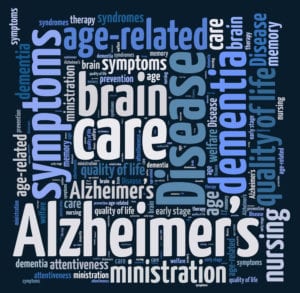Written by Angeline A. De Leon, Staff Writer. Supplementation with two grams of resveratrol significantly reduced proinflammatory markers and CSF Aß42 and slowed down cognitive decline in the thirty-eight participating subjects with Alzheimer’s disease.
 The Sirtfood Diet represents the latest nutritional trend in the promotion of weight loss strategies. This dietary plan revolves around the intake of foods rich in sirtuins, a class of proteins involved in the regulation of critical biological processes such as aging, metabolism, and inflammation. Aging research proposes a direct link between glucose metabolism and the beta-amyloid proteins associated with Alzheimer’s Disease (AD) such that caloric excess appears to accelerate the onset of AD 1. In fact, insulin resistance is now recognized as a key factor in the pathogenesis of neurodegenerative disease. Current hypotheses suggest that the activation of sirtuins, notably SIRT1, may play a role in the regulation of cellular energy which, when unbalanced, may negatively affect glucose metabolism and, thereby, increase risk of AD 2. Resveratrol, a potent polyphenol found in the skin of red grapes, is a notable SIRT1 activator, and studies show that intake of resveratrol in mouse models of AD is associated with reduced beta-amyloid deposition 3. In human subjects with AD, resveratrol has been seen to stabilize levels of CSF Aβ42 (declining levels of beta-amyloids in cerebrospinal fluid (CSF) correspond to increasing accumulation of plaques in the brain) 4 and is thought to be comparable to anti-amyloid immunotherapies for AD in terms of its anti-inflammatory effects in the brain 5. In an exploratory study 6 conducted at the Georgetown University Medical Center (2017), researchers tested the efficacy of resveratrol in attenuating markers of AD and its potential anti-inflammatory activity.
The Sirtfood Diet represents the latest nutritional trend in the promotion of weight loss strategies. This dietary plan revolves around the intake of foods rich in sirtuins, a class of proteins involved in the regulation of critical biological processes such as aging, metabolism, and inflammation. Aging research proposes a direct link between glucose metabolism and the beta-amyloid proteins associated with Alzheimer’s Disease (AD) such that caloric excess appears to accelerate the onset of AD 1. In fact, insulin resistance is now recognized as a key factor in the pathogenesis of neurodegenerative disease. Current hypotheses suggest that the activation of sirtuins, notably SIRT1, may play a role in the regulation of cellular energy which, when unbalanced, may negatively affect glucose metabolism and, thereby, increase risk of AD 2. Resveratrol, a potent polyphenol found in the skin of red grapes, is a notable SIRT1 activator, and studies show that intake of resveratrol in mouse models of AD is associated with reduced beta-amyloid deposition 3. In human subjects with AD, resveratrol has been seen to stabilize levels of CSF Aβ42 (declining levels of beta-amyloids in cerebrospinal fluid (CSF) correspond to increasing accumulation of plaques in the brain) 4 and is thought to be comparable to anti-amyloid immunotherapies for AD in terms of its anti-inflammatory effects in the brain 5. In an exploratory study 6 conducted at the Georgetown University Medical Center (2017), researchers tested the efficacy of resveratrol in attenuating markers of AD and its potential anti-inflammatory activity.
A total of 38 AD subjects (confirmed based on CSF Aβ42 < 600 ng/l at baseline), half receiving up to 2 g of pure synthetic resveratrol by mouth and half receiving matching placebo daily for 12 months as part of an earlier phase of a randomized, double-blind, placebo-controlled trial, were involved in a retrospective study. Banked CSF and plasma samples were analyzed to monitor markers of AD and detect the presence of inflammation.
At 52 weeks, the resveratrol group, relative to placebo, demonstrated significant reductions in CSF MMP9 (induced by presence of beta-amyloids, diagnostic biomarker of early stage dementia) (p = 0.0027). In comparison to baseline, resveratrol was associated with decreased plasma levels of pro-inflammatory markers, including IL-12P40 (p = 0.0485), IL12P70 (p = 0.0404), and RANTES (p = 0.0335). In addition, subset analyses revealed that resveratrol treatment significantly reduced CSF Aβ40 at 52 weeks, compared to baseline (p < 0.05). Cognitive function, measured by scores on the Alzheimer’s Disease Cooperative Study Activities of Daily Living Assessment (ADCS-ADL), also showed a twofold greater decline in placebo vs. resveratrol, indicating attenuation of cognitive decline with resveratrol (p = 0.0565).
Overall, findings suggest that resveratrol may support brain resilience to beta amyloid build up by modulating neuro-inflammation and coordinating immune response. Association of resveratrol treatment with reduced levels of CSF MMP9, identified as a key contributor to neurodegeneration, along with slowing of cognitive decline, based on ADL scores, supports hypotheses regarding SIRT1 activation as a potential therapeutic strategy for preventing neurodegenerative disorders.
Source: Moussa C, Hebron M, Huang X, et al. Resveratrol regulates neuro-inflammation and induces adaptive immunity in Alzheimer’s disease. Journal of Neuroinflammation. 2017; 14: 1. DOI: 10.1186/s1297-016-0779-0.
© The Author(s). 2017 Open Access This article is distributed under the terms of the Creative Commons Attribution 4.0 International License (http://creativecommons.org/licenses/by/4.0/)(http://creativecommons.org/publicdomain/zero/1.0/)
Click here to read the full text study.
Posted March 21, 2018.
References:
- Pasinetti GM, Wang J, Ho L, Zhao W, Dubner L. Roles of resveratrol and other grape-derived polyphenols in Alzheimer’s disease prevention and treatment. Biochimica et Biophysica Acta (BBA)-Molecular Basis of Disease. 2015;1852(6):1202-1208.
- Turner RS, Thomas RG, Craft S, et al. A randomized, double-blind, placebo-controlled trial of resveratrol for Alzheimer disease. Neurology. 2015;85(16):1383-1391.
- De Stefano N, Airas L, Grigoriadis N, et al. Clinical relevance of brain volume measures in multiple sclerosis. CNS drugs. 2014;28(2):147-156.
- Fox N, Black R, Gilman S, et al. Effects of Aβ immunization (AN1792) on MRI measures of cerebral volume in Alzheimer disease. Neurology. 2005;64(9):1563-1572.
- Vafadari B, Salamian A, Kaczmarek L. MMP‐9 in translation: from molecule to brain physiology, pathology, and therapy. Journal of neurochemistry. 2016;139(S2):91-114.
- Moussa C, Hebron M, Huang X, et al. Resveratrol regulates neuro-inflammation and induces adaptive immunity in Alzheimer’s disease. Journal of neuroinflammation. 2017;14(1):1.

